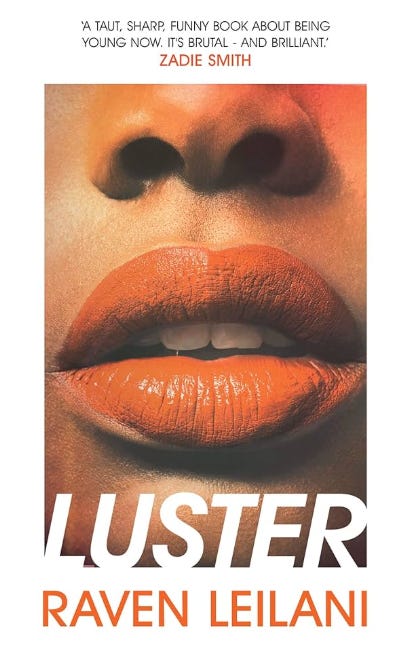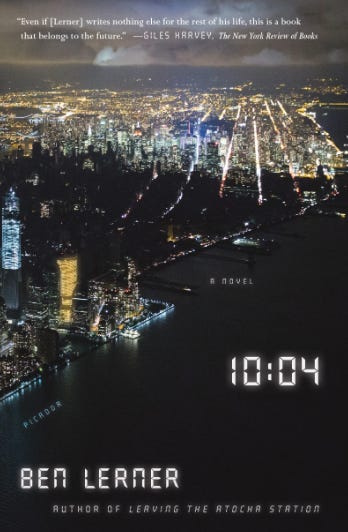New York City novels that depict something essential and vital about Summer in this City
with Rob Franklin, author of Great Black Hope
Reminder: I added a second book club meeting for Housemates on Wednesday, June 25th. Would love to see you there!!
I met Rob Franklin at a
reading in March. I had just started his debut novel, Great Black Hope, and went just to hear him read from it. It’s that good.He didn’t put it on his list (humble), but it’s an essential summer read. I’m adding it here, along with some praise:
Great Black Hope is gripping, elegant debut novel about a young Black man caught between worlds of race and class, glamour and tragedy, a friend’s mysterious death and his own arrest, from an electrifying new voice.
“It’s thrilling to see any author today aiming for the big stuff all at once: death, race, sex, class, addiction. It’s beyond thrilling—incandescent, even—when a writer like Rob Franklin comes along with the formal virtuosity to carry those lofty conceptual ambitions. Franklin’s prose is eminently readable, frequently laugh-out-loud funny, and full of sentences I want to cut out and glue to my forehead. This book is so smart, so moving, so earned; as soon as I finished, I started reading it again.”
—Kaveh Akbar, New York Times bestselling author of Martyr!
Favorite (summer in) New York City novels
Just this morning, lazily loping to my couch, I watched the season opener of And Just Like That: the much-maligned, much-talked-about Sex and the City reboot. While I’ve found many of the narrative choices of the last two seasons ill-advised (the woke-ification of Charlotte York, Miranda’s two-episode alcoholism arc, Che Diaz), I know I’ll never stop watching, because what the show lacks in narrative direction it often makes up for in charm -- the details that create the texture of New York City, ever pleasurable to see on screen. For example: early in this episode, a swarm of violet robes in Washington Square Park signal the end of another school year, and usher us into the season’s theme (which features prominently on the promo poster, above the now-five City Girls strutting Abbey Road style down a busy street): Summer in the City.
Summer in New York City is, to quote Didion out of context, an “infinitely romantic notion.” A season of sweaty, endless nights and backyard barbecues and rooftops and spritzes and parties; as well as pit-stains and pockmarks and garbage stewing in the sun. It is, for better or worse, when the City is most itself: manic, hectic, hopeful. Only in summer does one leave one’s apartment for coffee and, swept up in that hazy rhythm, not return until dawn. Finishing this episode of And Just Like That, I COULDN’T HELP BUT WONDER what are my favorite New York City novels, and particularly novels that depict something essential and vital about Summer in this City. So here’s a few:
The Bell Jar by Sylvia Plath
Esther Greenwood is a bright, beautiful, enormously talented young woman, but she's slowly going under—maybe for the last time. Sylvia Plath brilliantly draws the reader into Esther’s breakdown with such intensity that her neurosis becomes palpably real, even rational—as accessible an experience as going to the movies. A deep penetration into the darkest and most harrowing corners of the human psyche, The Bell Jar is an extraordinary accomplishment and a haunting American classic.
I re-read this recently for the first time since freshman year of college (when I read it performatively in a lecture for which it was not assigned, hoping my crush would notice my cool sadboi vibe — and reader, he did!). Overshadowed by the slow descent into madness for which the book is known is those early chapters — when Esther Greenwood is drifting about the sweltering city as a women’s magazine intern, going to lunch with famed, pretentious poets and cocktail hours with Yale boys and sweating through her party dress. There’s something about that opening chapter — when Esther blows off the party with her bad-influence friend Doreen to go with some strange men to a bar, then an afterparty where everything goes to shit — that so perfectly captures the kinetic, menacing thrill of a night out in New York. How it can seem to stretch for days. And the opening line is still one of my all-time favorites:
“It was a queer, sultry summer, the summer they executed the Rosenbergs, and I didn't know what I was doing in New York.”
Open City by Teju Cole
A haunting novel about national identity, race, liberty, loss, dislocation, and surrender, Teju Cole's Open City seethes with intelligence. Written in a clear, rhythmic voice that lingers, this book is a mature, profound work by an important new author who has much to say about our country and our world.
Though this novel spans several seasons, I associate it strongly with summer because I read it my first summer in New York. It was 2012, and I was interning at an education reform non-profit about 20 hours a week, living at my friend’s parents’ place on Central Park West. Broke in an admittedly boujee way, I would steal the food they used for entertaining: charcuterie and soft cheese from Zabar’s, Levain cookies, and the peanut butter intended for the dog’s daily pill. In any case, that summer, I spent a great deal of time roaming the city: downtown where the nonprofit was headquartered, over in Carroll Gardens where I was stationed in a local public school, uptown in the park; I walked everywhere, wanting to see it all. And when I stumbled upon Open City, which I purchased from a street vendor in the Village, I found a perfect companion in this elliptically digressive novel of wandering. The intellect and music of it astounded me, and it helped me to develop a critical lens — meditations on race and class and power — that changed the city’s hue.
Sex and Rage by Eve Babitz
‘Sex and Rage’ delights in its sensuous, dreamlike narrative and its spontaneous embrace of fate, and work, and of certain meetings and chances. Jacaranda moves beyond the tango of sex and rage into the open challenge of a defined and more fulfilling expressive life. ‘Sex and Rage’ further solidifies Eve Babitz's place as a singularly important voice in Los Angeles literature—haunting, alluring, and alive.
I know, I know. Most of this novel — a heavily autobiographical work by Eve Babitz, about a young it-girl writer named Jacaranda Levin — is set in Eve’s native Los Angeles. But it’s the New York section that stands out to me; in particular, the extended scene where Jacaranda runs into her estranged frenemy Max, charter member of what she dubs “the barge”: the rarefied, jet-set who seem to live in a perpetual summer, their calendars packed with Miami art weeks and European vacations. Having run afoul of the barge, due in part to a desire to be viewed as an artist instead of a muse, Jacaranda finds herself hating Max and mythologizing how awful he is — that is, until she sees him in New York. And for a night, all of his charm and ease draws her back in. The characterization of Max’s New York is so perfectly rendered: as alluring and sinister as a siren. And I can’t think of another work of art (other than perhaps Jessa/Hannah in season 6 of Girls) that captures how a friend break-up can be every bit as wounding and epic as a romance.
Luster by Raven Leilani
Razor-sharp, provocatively page-turning and surprisingly tender, Luster by Raven Leilani is a painfully funny debut about what it means to be young now.
If Sex and Rage is Gossip Girl, this is Broad City: a rat-infested, railroad apartment vision of New York living. Leilani so masterfully depicts the carnal bits of New York summers: the experience of being a body in a crowded room; of zooming up 8th avenue on a citibike, your forehead glazed with sweat. The sweet stink of the city mid-summer. And in doing so, she suggests that a certain romantic vision of the city is available only to the rich, who can afford to flee or to insulate themselves from its brutal realities. Besides, I just love the dynamic rhythms of her sentences. A favorite:
“The city rises around me in a bouquet of dust, industrial soot, and overripe squash, insisting upon its own enormity like some big-dick postmodernist fiction and still beautiful despite its knowledge of itself, even as the last merciless days of July leave large swaths of the city wilted and blank.”
10:04 by Ben Lerner
In the last year, the narrator of 10:04 has enjoyed unlikely literary success, has been diagnosed with a potentially fatal medical condition, and has been asked by his best friend to help her conceive a child. In a New York of increasingly frequent superstorms and social unrest, he must reckon with his own mortality and the prospect of fatherhood in a city that might soon be underwater.
This novel, which opens on the High Line amid an “unseasonable warmth,” is another that spans several seasons in the city. But it is, in some ways, a book about seasonality, and weather -- or at least bounded by it, as Hurricanes Sandy and Irene book-end the plot. But what sticks with me about this portrayal of New York, beyond certain beautifully rendered images (the “impossibly tender” octopi that were “literally massaged to death”) is the ekphrastic writing, particularly about Christian Marclay’s “The Clock.” Recently, during a lesser New York City storm, I stepped into MoMA and was finally able to see “The Clock” for myself. Sitting there for over an hour, I had the intensely pleasurable feeling of having stepped into a scene from one of my favorite novels — thinking, through a Lerner lens, about time and how we impose meaning onto it. In all of his books, and Atocha Station and 10:04 in particular, Lerner uses the ekphrastic mode not just to render the experience of consuming art on the page, but to heighten the tensions and themes already at play in the narrative. And in this book, he deftly captures how our experience of New York City is always colored by the overabundance of, and tension between, art and capital.
Thank you, Rob! Now everyone go read Great Black Hope!!
Liz













Sex and rage absolutely belongs on this list!! Can’t wait to read Great Black Hope!!
Love the girls and broad city references in this so much. Will be reading great black hope!